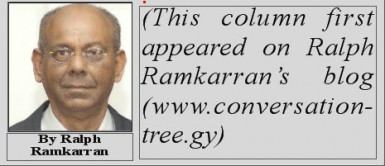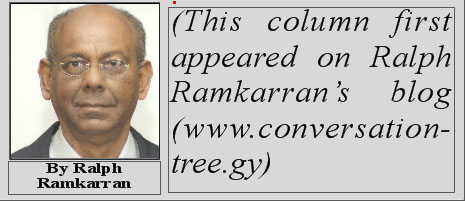Guyanese will be able to assess the future of the PPP, and the government it leads, by the way in which it treats with the electoral defeat of 2011 at its upcoming Congress. Defying all rational odds and holding on to a minority government, courtesy of the Burnham constitution, the results of the elections signalled the most serious crisis facing the PPP since 1992. With its popular vote slipping from 53 per cent to 48 per cent, the leadership will have to give some account of its stewardship to the party, or lack thereof, which could have resulted in such a dramatic decline in fortunes after so much bluster and bombast over the past ten years and during the election campaign.
No information has been revealed by the PPP as to the results of any analysis made by it of the reasons for its dismal performance. The word is, however, that no analysis has been done but two general views prevail. One is that support fell off because of failures of the government which includes arrogance, extravagance, corruption and loss of support of sugar workers because of the high-handed attitude to them. The other is that the party organizational capacity faltered, lost contact with the people and failed to organize the turnout of voters.
The Central Committee Report will be forced to analyse the reasons for the loss. But the reasons will be anecdotal, would be based on no serious investigation, and would seek to attribute only collective responsibility for the loss. It will probably admit some governmental mistakes but only enough to give the report a bit of credibility. Dr Jagdeo, who headed the government and on whose head any criticism may fall, is still untouchable. To avoid emphasis on the government’s performance, the major fault will be placed on the failure of the party to mobilize the supporters to vote. Since the biggest drop in support was in Berbice, the promotion of the party leader in Berbice to head of the party’s entire organization as Executive Secretary would indicate how much the compilers of the Central Committee Report believe what they are saying and how much credibility such a conclusion would carry.
 If the party leadership is serious, it will provide the membership with an honest assessment of the problems which the party now faces. While over the past ten years the government has made enormous strides as the figures show, in critical areas of PPP support, the party has failed. The decline of the sugar industry to its current parlous state began five or six years ago. The virtual collapse of this industry provided fertile ground for the inroads made by the AFC in Berbice. The Central Committee Report needs to outline serious plans, acceptable to the membership and to the opposition, as to how it intends to revive the industry and restore the support of sugar workers.
If the party leadership is serious, it will provide the membership with an honest assessment of the problems which the party now faces. While over the past ten years the government has made enormous strides as the figures show, in critical areas of PPP support, the party has failed. The decline of the sugar industry to its current parlous state began five or six years ago. The virtual collapse of this industry provided fertile ground for the inroads made by the AFC in Berbice. The Central Committee Report needs to outline serious plans, acceptable to the membership and to the opposition, as to how it intends to revive the industry and restore the support of sugar workers.
If the party leadership is serious, it will own up to the serious negative impact that corruption has had on its support. On this issue the party is in denial. It is in denial because the party is now in the grip of a new and rising class of entrepreneurs who will not allow any form of oversight to challenge their dominance of certain lucrative sectors of the economy, in particular, but not exclusively, procurement. That is why there will never be a Public Procurement Commission until there is a major uprising. Even then I believe that the government will probably prefer to go to the polls rather than establish a PPC. In order to win back support the government must come clean on corruption and tell party members what measures it plans to put in place to combat this scourge.
In relation to the party, the older comrades have fallen off because of age and abuse. The past ten years were proclaimed as the era of youth. The older generation on the ground drifted away in this inhospitable atmosphere of intolerance and impatience with them. Some of the older comrades also left active party work to take advantage of the economic opportunities offered by the numerous contracts available at the regional level. New members, also looking for all kinds of benefits, were neither trained nor inclined to perform the chores which are necessary to keep the flock together.
The nature of party work never changed. Forty years ago there was a rather streamlined agenda for group meetings which included membership drive, fundraising, literature sales and educational. Party groups are still struggling with these outdated and unattractive agenda items but they have long ceased to have any kind of resonance. New kinds of campaigns which Cheddi Jagan realized would have been needed in the new era of governance, to be carried by the CDCs (Community Development Councils) led by party groups, faltered shortly after the new PPP demonstrated little interest. These would have refocused party work on development issues, giving it a new agenda and a new life. Our ‘old’ but visionary leader’s ideas were cast aside like so many people and policies. Even a poverty alleviation agenda for party groups in the communities in which they operate, which have seen Islamic groups develop and maintain strong support for decades, was not pursued.
These are some ideas which the Central Committee Report is unlikely to adopt. But if it does it will signal a clear intention to correct the mistakes of the past and set the party back on the road to success.










